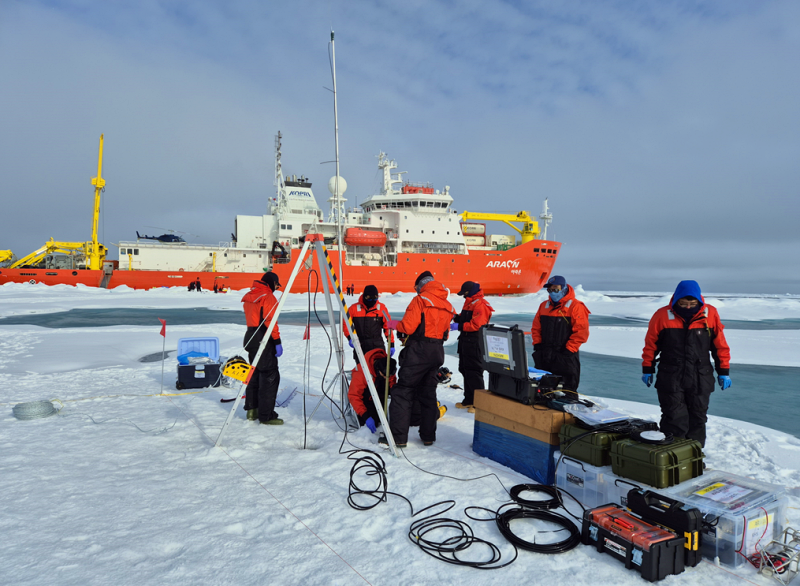Information Center
- Main page
- Information Center
- Government News
Government News
- Source
- korea.net
- Date
- 2025.04.01

With an Araon icebreaker research vessel anchored on the Arctic sea ice, a research team of the Korea Polar Research Institute (KOPRI) last year studies the ice's properties. (KOPRI)
By Park Hye Ri
The Ministry of Oceans and Fisheries on March 30 announced in a world first confirmation of the expansion of Atlantification of the Arctic Ocean deep into the latter's western section that touches the Pacific.
Referring to the spread of warm waters from the Atlantic to the Arctic Ocean due to climate change, Atlantification progressively raises the temperature and salt concentration of the latter ocean, and if the high temperature reaches the ocean surface, it can melt sea ice.
A joint research team of the Korea Polar Research Institute and the University of Alaska Fairbanks confirmed the intensification of Atlantification, having run together since 2017 a long-term Korean-style moored observation system in the East Siberian Sea of the western Arctic.
Ocean waters with high temperature and salinity due to Atlantification are relatively dense in the middle of the Arctic's middle layer. Since the early 2000s, the team found that the top layer of the high-temperature, high-salinity water in the western Arctic rose about 90 m higher.
This verified Atlantification's expansion to the opposite end of the Arctic and marked the first time that vertical changes in the phenomenon was confirmed through annual long-term observations of the ocean's western section.
In addition, the research team said the heat produced by Atlantification affected the marine ecosystem by bringing nutritious salt to the surface, with such salt providing food for primary marine producers living on the surface like phytoplankton and sea ice microlagae. The progression of Atlantification was also found to raise the abundance of such salt and contribute to the thriving of marine surface organisms and productivity.
"Through homegrown technology, this in-depth study analyzed changes in the western Arctic Ocean, which was hard to access on-site and suffered from lack of prior research, in showing the decline of sea ice with changes in the marine ecosystem faced by the Arctic," Minister of Oceans and Fisheries Kang Do Hyung said. "We will continue polar research to respond to climate change."
hrhr@korea.kr